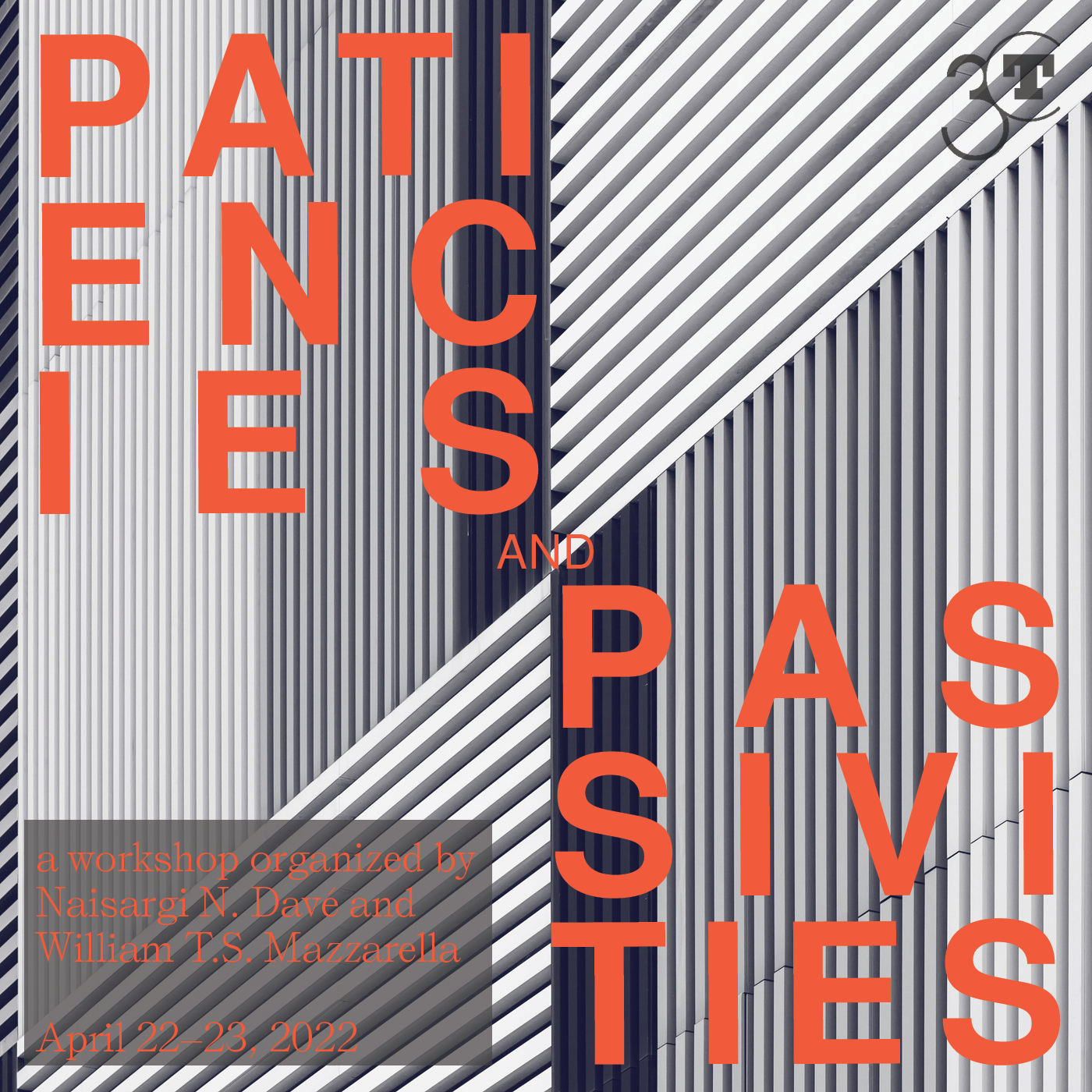Categories
Patiencies and Passivities
Friday, April 22, 2022, 9:00am–5:00pmSaturday, April 23, 2022, 9:00am–12:00pm
These are urgent times: climate catastrophe, violent dispossession, and “ordinary chronic cruddiness” all necessitate action. Action is necessary. At the same time, the very attachment to the capacity for action—action as an imperative—underlies capitalist accumulation, territorial expansion, productivism, and the “will to improve.” This symposium explores alternatives to activity, ethnographically and philosophically, through the concepts of patiency, radical passivity, active passivity, and passion. Patiency is not passivity in the sense of an absence of activity. Patiency is affirmative: cultivated practices of surrender, of attentiveness to resonance, of selective and collective refusals, of willing not to will, of indifference to differences. This workshop argues for the queerness of patiency, as a disruption of norms in which recognizable activity is the measure of ethical and political personhood. Patiency as a concept also seeks to sharpen our attentiveness to potential, becoming, and other vitalities. These interventions all contribute in different ways to what we might call a “slow anthropology”—ethnography that queers the activity imperative, that is attentive to stillness and to stilled attention, and that finds action (however we might define it) in ordinary and extraordinary practices of patiency.
This workshop is organized by Naisargi N. Davé (University of Toronto) and William T.S. Mazzarella (University of Chicago), and presenters include Ned Dostaler (University of California, Berkeley), Sarah Pinto (Tufts University), Hoon Song (University of Minnesota), and Lisa Stevenson (McGill University).
Please note that this workshop is now fully booked. If you would like to be added to the waiting list, please send a short bio to Anna Searle Jones. Papers will be pre-circulated to registrants in early April.
Naisargi N. Davé is Associate Professor of Anthropology at the University of Toronto. She is the author of Queer Activism in India and of the forthcoming, Indifference: On the Praxis of Interspecies Being.
Ned Dostaler is a student of anthropology and psychoanalysis. He is, currently, occupied with reading, writing, and living in relation to the question: how and why does a problem come into being? Thinking with and about sand, in Chennai—and, also, why he has been drawn to thinking with and about sand, in Chennai—is one of the contexts in which he is inhabiting this question. In doing so, he draws upon a range of scholarship, including critical theory and object relations.
William T. S. Mazzarella is Neukom Family Professor of Anthropology and of Social Sciences in the College at the University of Chicago. He is also Associate Faculty in the University of Chicago Divinity School and a Faculty Fellow of the Chicago Center for Contemporary Theory. His books include Shoveling Smoke: Advertising and Globalization in Contemporary India (Duke, 2003), Censorium: Cinema and the Open Edge of Mass Publicity (Duke, 2013), The Mana of Mass Society (Chicago, 2017), and, with Eric Santner and Aaron Schuster, Sovereignty, Inc: Three Inquiries in Politics and Enjoyment (Chicago, 2020).
Amy McLachlan
Hoon Song teaches Anthropology in the Department of Anthropology at University of Minnesota, Twin Cities. He is the author of Pigeon Trouble: Bestiary Biopolitics in a Deindustrialized America (U. Penn Press, 2010), and is currently engaged in two projects: Co-editor (with John Lie and Lisa Min), North Korea Seen and Unseen (U. California, Berkeley Press; Forthcoming); Author, Incompossible North Korea (Fordham U. Press; In Process).
Lisa Stevenson is an Associate Professor and William Dawson Scholar in the Department of Anthropology at McGill University. Stevenson’s work attempts to trace and describe imagistic forms of thought in the everyday worlds of people in situations of violence. Her book Life Beside Itself: Imagining Care in the Canadian Arctic (University of California Press, 2014) won the 2015 Victor Turner Book Prize and the 2020 Staley Prize. Stevenson’s work in filmmaking includes a short film Into Unknown Parts, which debuted at the 2017 Margaret Mead Film Festival, and a Mellon New Directions Fellowship.
